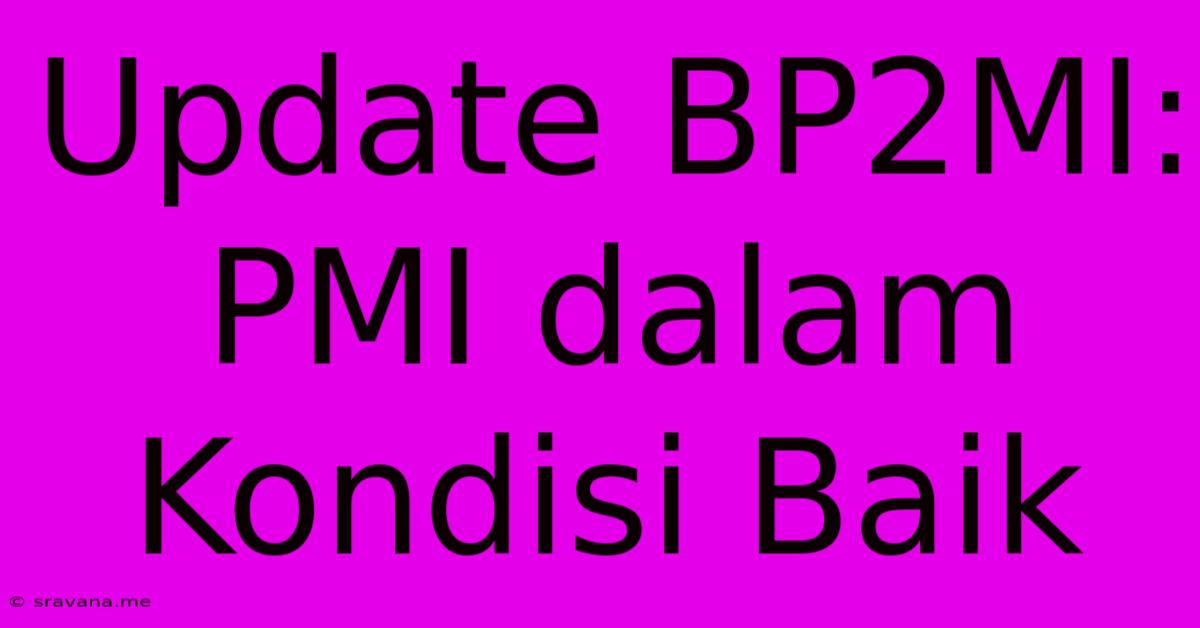Update BP2MI: PMI Dalam Kondisi Baik

Discover more detailed and exciting information on our website. Click the link below to start your adventure: Visit Best Website sravana.me. Don't miss out!
Table of Contents
Update BP2MI: PMI dalam Kondisi Baik – A Deep Dive into the Positive Trends in Indonesian Migrant Worker Welfare
The Indonesian government, through the Badan Pelindungan Pekerja Migran Indonesia (BP2MI or Indonesian Migrant Workers Protection Agency), has been working tirelessly to improve the welfare and protection of Indonesian Migrant Workers (PMIs). Recent updates paint a picture of significant progress, indicating that many PMIs are currently in good condition, both physically and psychologically. This article will delve into the latest reports from BP2MI, analyzing the key factors contributing to this positive trend and examining the ongoing challenges that remain.
Key Indicators Showing Improved PMI Welfare
BP2MI's recent reports highlight a number of positive developments regarding the condition of Indonesian migrant workers. These include:
-
Increased Pre-Departure Training and Education: A significant focus has been placed on equipping PMIs with the necessary skills and knowledge before their departure. This includes comprehensive training on their respective jobs, cultural awareness, legal rights, and health and safety protocols. This proactive approach has demonstrably reduced instances of exploitation and vulnerability overseas.
-
Strengthened Partnerships with Destination Countries: BP2MI has been actively forging stronger relationships with governments and agencies in destination countries. This collaboration facilitates better protection mechanisms, streamlined processes for addressing issues, and more effective enforcement of labor laws protecting Indonesian workers. Improved communication channels have also enabled quicker responses to emergencies.
-
Enhanced Monitoring and Protection Mechanisms: The agency has invested heavily in developing robust monitoring systems that track PMIs throughout their employment period. This includes regular communication, access to support networks, and prompt intervention in cases of abuse or exploitation. The implementation of a 24/7 hotline and online reporting systems has proven invaluable in providing immediate assistance.
-
Improved Access to Healthcare and Financial Services: BP2MI has been working to ensure that PMIs have access to affordable and quality healthcare services, both during their employment and upon their return. Furthermore, initiatives are underway to provide access to financial literacy programs and secure banking options, empowering PMIs to manage their finances responsibly and avoid falling prey to financial scams.
-
Successful Repatriation Programs: BP2MI’s efficient repatriation programs for workers facing difficulties or exploitation have significantly improved. These programs provide crucial support during the repatriation process, including assistance with travel arrangements, medical care, and reintegration into Indonesian society.
Analyzing the Contributing Factors
The improvements in PMI welfare are not simply coincidental. Several factors have contributed significantly to this positive trend:
-
Government Commitment: The Indonesian government’s unwavering commitment to protecting its citizens working abroad is fundamental. Increased funding, improved infrastructure, and the expansion of BP2MI's capabilities have all played a crucial role.
-
Technological Advancements: The utilization of technology, such as online platforms and mobile applications, has greatly enhanced communication, monitoring, and the overall efficiency of BP2MI’s operations. This has enabled real-time tracking of PMIs and quicker response times to emergencies.
-
Increased Public Awareness: Extensive public awareness campaigns have educated prospective PMIs about their rights, the risks involved, and the support available through BP2MI. This empowerment has led to more informed decision-making and a decrease in vulnerability.
Remaining Challenges and Future Directions
Despite the significant progress, challenges remain. These include:
-
Addressing Irregular Migration: Combating illegal recruitment practices and addressing the issue of irregular migration remains a significant challenge. This requires strengthening collaborations with both domestic and international partners to tackle the root causes of irregular migration.
-
Protecting Vulnerable Groups: Special attention needs to be given to protecting vulnerable groups, such as women, young workers, and those with disabilities. Tailored support and protection mechanisms are needed to address their specific needs and vulnerabilities.
-
Enhancing Post-Return Support: Providing comprehensive post-return support, including reintegration programs and access to job opportunities, is critical in ensuring the long-term well-being of returning PMIs.
-
Continuous Monitoring and Evaluation: Continuous monitoring and evaluation of BP2MI's programs are essential to ensure their effectiveness and adapt to evolving challenges. Data-driven decision-making will be crucial in improving the agency’s strategies and achieving better outcomes.
Conclusion: A Positive Outlook for Indonesian Migrant Workers
The recent updates from BP2MI showcase a significant improvement in the welfare of Indonesian migrant workers. The agency's dedicated efforts, strengthened partnerships, and innovative approaches have contributed to a more positive and protective environment for PMIs. While challenges remain, the ongoing commitment to enhancing protection mechanisms and addressing the root causes of vulnerabilities offers hope for a brighter future for Indonesian Migrant Workers. The positive trajectory indicates a strong commitment towards ensuring that PMIs are not only economically empowered but also physically and psychologically safe throughout their work experience abroad. The focus on pre-departure training, enhanced monitoring, and improved repatriation processes reflects a holistic approach to PMI welfare, paving the way for more sustainable and ethical migration practices. The future looks promising for Indonesian migrant workers, with the continued dedication and efforts of BP2MI at the forefront.

Thank you for visiting our website wich cover about Update BP2MI: PMI Dalam Kondisi Baik. We hope the information provided has been useful to you. Feel free to contact us if you have any questions or need further assistance. See you next time and dont miss to bookmark.
Also read the following articles
| Article Title | Date |
|---|---|
| Kasus Hmpv Meningkat Di Malaysia | Jan 14, 2025 |
| Westwood Brand Sees Profit Increase | Jan 14, 2025 |
| Uk Floods Major Incidents Declared | Jan 14, 2025 |
| Kemenkes Ri Cegah Penyebaran Hmpv | Jan 14, 2025 |
| Gerrard Warned After Partying With | Jan 14, 2025 |
